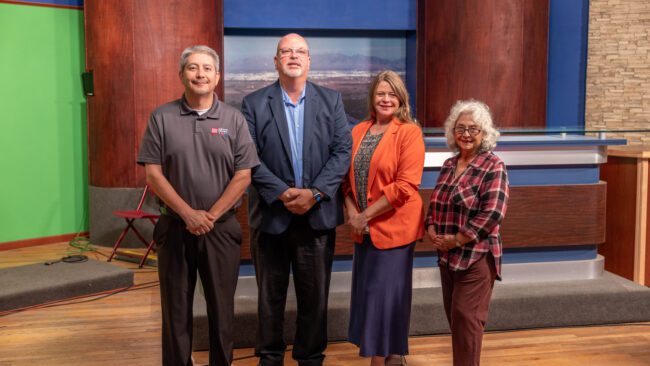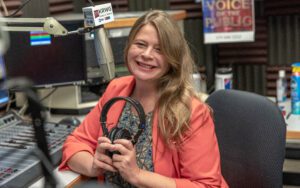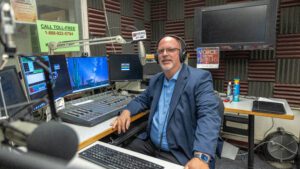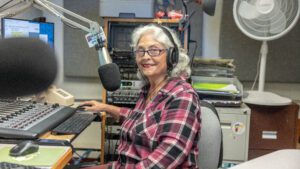As told to Elaine Stachera Simon
The nonprofit Corporation for Public Broadcasting (CPB) was founded in 1967 during the Johnson administration to distribute federal funds to public broadcasting stations to ensure universal access to non-commercial, quality media across the country.
The recent defunding of the CPB by Congress has major repercussions, especially in rural states like New Mexico. KRWG Public Media, located on the NMSU main campus and serving southern New Mexico and West Texas, has lost $1.1 million in annual CPB funding: 35% of KRWG-TV’s budget and 25% of KRWG-FM’s budget.
KRWG Public Media audiences range from preschoolers learning to read with Cookie Monster on Sesame Street to news hounds tuning in every Saturday to see how they would fare on Wait Wait … Don’t Tell Me. Television shows like PBS News Hour and BBC News help us make sense of the world; children’s programs like Arthur and Mister Rogers’ Neighborhood encourage compassion and imagination; and all-time favorites such as Rick Steves’ Europe and This Old House have us grabbing our suitcase and a hammer. The KRWG-FM lineup includes popular national programs such as Morning Edition, Fresh Air, and Performance Today, as well as local shows like Fiesta!, the Silver City Report, and Voice of the Public. (Find complete schedules at krwg.org.)
The NMSU Foundation sat down with KRWG General Manager Adrian Velarde to discuss how defunding will affect KRWG FM and TV programming — and what needs to be done now.
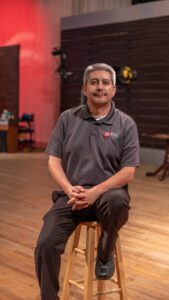
What feedback have you received from KRWG viewers and listeners regarding the defunding?
We’ve received a tremendous outpouring of concern. I started getting phone calls immediately after the defunding was announced.
Yes, this is a challenge, but KRWG Public Media isn’t going anywhere. Yes, we need to adapt and make some changes, and we’re still figuring out what those changes will be. Frankly, we’ve planned for this — but it’s one thing to plan and another to face reality. Still, I am optimistic. Our new motto is “Defunded, not defeated.”
What are the immediate impacts?
First, we’re working on identifying money-saving efficiencies. That said, we already run very lean, and there are not a lot of places to cut. Our core commitment is to preserve services, and to do that, you have to preserve people. This commitment to our viewers and listeners is not changing.
We have found what we believe will be some significant technological efficiencies regarding signal delivery, and that’s in the works.
There may be some impact to paid programming from NPR [National Public Radio] and PBS [Public Broadcasting Service], and we already know local news will be impacted. We are fortunate to have multimedia journalist Abigail Salas, a New Mexico Local News Fund Fellow, working with us for one year, and we are exploring hiring a second journalist. There are intangibles that are lost with a reduction of news coverage, so we are committed to robustly preserving our news services as much as possible. KRWG is part of the fabric of southern New Mexico and West Texas, and I fear that a reduction in local news coverage and stories will weaken that fabric.
Finally, reliability may eventually be affected. As our engineers retire or go elsewhere, we won’t be able to replace them and will rely on contract engineers. Fortunately, we’re in a good place right now as far as equipment goes.
What is the effect of the defunding of public media across New Mexico?
I don’t know if other stations across our state will have to go off air, but I expect that most will, like KRWG, adapt. Similarly, they may not provide the breadth of services or have the same reliability, but I hope they can continue to serve their regions.
People can find out more about the effects of the CPB funding cuts to other public media outlets in New Mexico by listening to the roundtable discussion that Senators Martin Heinrich and Ben Ray Luján held with station leaders from across the state in early August.
One thing that may surprise people is the relationship between public media and public safety.
Absolutely. Public media was designed to reach underserved and minimally populated areas. In rural communities, public media is often the only source of free, over-air emergency alerts on mobile phones, radio, and TV. If a station is lost, these areas lose emergency alerts about dust storms, red-flag warnings, flash floods, wildfires, and amber and silver alerts.
KRWG and other public media stations use the PBS WARN [Warning, Alert Response Network] system. In an emergency, FEMA sends a Wireless Emergency Alert to all wireless carriers and PBS, which sends the alert to public television stations, and then the stations send it to mobile devices. Because the alerts are sent on television frequencies, they will pick up the signal even without internet, even if cell service is nonexistent, as long as they are in the viewing area of a public TV station.
This has real-life implications. One of the first calls I got when I started working at KRWG was from a woman in Elephant Butte who could not afford cellular service. KRWG was her “window to the world” for TV and radio, but also for emergency alerts.
How has the defunding affected KRWG staff?
Their resilience inspires me, and I don’t say that lightly. They recognize the importance of their collective work and the impact it has on people in our region. To a person, they are aligned with the KRWG public media mission.
Regarding the funding cut: I’ve tried to be transparent about what it will mean for us, but so much remains unknown. One thing that is certain is that we’ll be asking more of them, not just to adapt but to help us figure out what else we can do. The team is committed and determined to make it work, and I am grateful for the work they’re doing.
What can people do to help?
As I mentioned, our new motto is “Defunded, not defeated.” Over the years, we’ve made good financial decisions, and generous donor support has placed us, for the moment, in a good position. We say it all the time: We can’t do it without the support of listeners and viewers like you. Truly, with the defunding, this has taken on a whole new meaning.
We’ve had such an outpouring of support from the community — for us to hear from so many about the role KRWG plays in their lives and their concern about the future has been humbling. Because of viewer and listener support, I believe that KRWG will not only exist but thrive and that this is just a speed bump. But it’s also uncharted territory for us, and we don’t have all the answers yet.
What can people do? In addition to financial support, we love it when you share your enthusiasm for our work! Put your driveway moments on social media. Send us your story ideas to feedback@nmsu.edu — we check this email regularly.
Join us in creating a cycle of positivity. We want listeners and viewers to know we’ll adapt as needed, and we are here for you. We take the “public” in public media seriously, and we’re doing everything in our power to maintain the special connection we have with the communities we serve.
Now more than ever, KRWG Public Media needs the support of listeners and viewers like you. Give to KRWG-TV or KRWG-FM at Give to KRWG | New Mexico State University Foundation.
